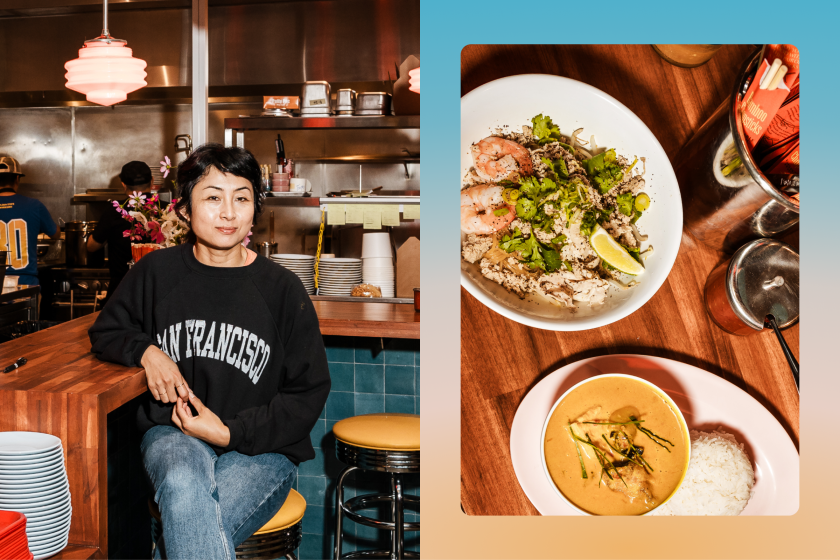Confessions of a Passover <i> Schnorrer</i>
There is no word for what I am. Even Yiddish, a language that has immortalized schlemiels , shmendricks and zhlubs, has no name for me. I am a seder hustler.
Every year around Passover, I start hanging around my Jewish friends, hoping someone will pop the question and invite me to the holiday meal.
âMan, I sure could go for some unleavened bread. You folks havinâ a big seder this year?â Iâll say, and then Iâll shoot them the lost-at-Ellis-Island look.
âSeder hustler!â they scream and head for the kosher hills.
I know what youâre thinking. Why not make your own seder?
The thing is, itâs a lot easier to be Jewish than to do Jewish. Although I realize that for thousands of years others have managed to get it together, Iâm afraid to organize a seder where book worship and food worship combine with real worship. Thereâs so much room for error. For being B-A-D.
The Jewish Community Center, which offers classes in everything from âAssertiveness for Womenâ to âHealing Crystals and Yeast,â has no âSeder From Scratchâ class. And where the heck is modern tech? I keep hoping someone will produce âSeder!--The Video.â Or maybe âJane Fondaâs Passover Workoutâ (âBurn that brisket! Whew!â).
My mother never taught me. Every year Iâd watch in awe as she slaved over caldrons of soup. Even after my bachelor uncles got married and moved out of the house, my mother would still send them chicken soup by taxi on Passover.
Iâd see her sculpt gefilte fish with her bare hands. Iâd watch her hide the weekday dishes and the Sabbath dishes and get out the special Passover dishes. But she wanted me to be a modern American woman. I suppose she hoped I would marry a rich man and we could order out from Dial-a-Seder.
âGo watch TV,â sheâd say if she caught me watching her. And most of the Old World customs died with her.
When I was in my teens, my family went completely modern. We bought a long-playing album called âA Passover Seder With Jan Peerce.â Instead of my father reading the prayers and leading the songs, weâd sing along with Jan. I always hoped the record would get scratched at one of the wine prayers and everyone would get that Manischewitz buzz before realizing the needle was stuck.
During the â60s, in Berkeley, I got invited to my first New Age all-vegetarian seder. Instead of the traditional plate of bitter herbs, there were all sorts of weird hippie herbs. Instead of the traditional question, âWhy is this night different from all other nights?â someone asked, âLike, whatâs happening tonight that isnât happening, like, every night?â
I hustled my way into several other weird seders during that era, including a Judeo-Communist one in which the traditional Passover prayer book, the Haggadah, sat alongside Maoâs Little Red Book. The journey of a thousand matzot begins with the first bite.
Finally, in the â80s, I met Tom and Sharona. As far as Iâm concerned, this was the jackpot. Smart, witty and attractive, they did a traditional seder with great food and quality wine. They always had interesting guests like Israeli scientists and French environmentalists. I thought I was in Fat Seder City.
Then, they had two babies. This limited Sharonaâs seder outreach and left me having to hustle my way into another seder.
Two years ago, a long-lost cousin called and invited our family. It was a nice gathering, but so many people had married Gentiles or left the fold that no one knew how to do a seder.
This year, I didnât kibitz around the bush. When a friend said she was having a seder, I asked her at point-blank range to invite me. I told her Iâd beat her up if she didnât--which, where I come from, means Iâd make her feel very guilty.
I even offered to roll up my sleeves and roll the matzo balls. Years ago, some mysterious force compelled me to make the healing chicken broth of my ancestors, and it came out just right. The Passover rituals have to be learned from a book, and the prayers have to be translated. But the soup is in my DNA.
More to Read
Eat your way across L.A.
Get our weekly Tasting Notes newsletter for reviews, news and more.
You may occasionally receive promotional content from the Los Angeles Times.










